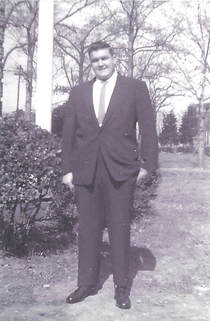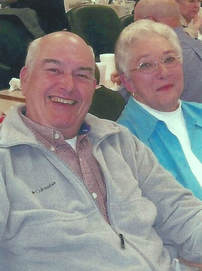 Wade Smith in 1957, the year he graduated from Methodist Orphanage. Wade Smith in 1957, the year he graduated from Methodist Orphanage. Wade Smith was born near Enfield in Halifax County to “a poor, very poor” sharecropping family. He was the only one of six children in his family to complete high school, much less college, he says, because of Methodist Orphanage. Wade was 10 years old in 1950 when his parents ended their 27-year marriage, and his mother and a county welfare worker arranged for him to go to Methodist Orphanage with his two younger sisters, Jean, 8, and Becky, 6. He lived seven years on the MO campus and learned the benefits of kindness, opportunity and hard work. “The orphanage taught you that nothing was free,” he says. “You had to work hard to get anything.” The orphanage also taught him that people cared about him and wanted to help. House mother Mabel “Muh” Brown gave him the gentle and consistent encouragement he needed when he arrived, feeling homesick and afraid of what the future might hold. “God had to put her there for a reason,” he says. “She really got me through the early days.” MO teacher Irma Holland and principal B.P. Hammack inspired him to do well in school, and his sponsor church, Ellerbe United Methodist in Richmond County, sent checks for his clothes, books and other necessities and hosted him for summer vacations. There was opportunity for children at MO, and Wade recognized its potential to improve his life. By 1954, his mother had remarried and invited the children to come live with her. Becky and Jean accepted the offer, but Wade at the last moment decided to stay at MO. “I didn’t see a future going home,” he says. “I saw a future if I stayed and completed my high school education.” Wade played football during his last two high school years, and he was manager for MO’s baseball and basketball teams. Graduating in 1957, he enrolled in Louisburg College with a loan from the orphanage and scholarships. After a year, he transferred to the University of Richmond, but dropped out after his father’s death in 1957. Two years later he returned to Louisburg and completed his associate degree, making ends meet by managing the school library at night. During this time he met his future wife, Nancy, on a blind date to hear the Lester Lanin Orchestra perform for the 175th anniversary of Louisburg College. Wade moved south to attend N.C. State and graduated in 1964 with a Bachelor of Science in chemistry. While in Raleigh, he lived once again on the MO campus—this time earning room, board and a little cash by tutoring, coaching and driving the school bus to football games, the state fair and other outings. He and Nancy were married soon after graduation and moved to Chesterfield, Va., so that he could take a job with J.M. Fry Printing Inks Co. He stayed there for his entire career, retiring as a vice president after 36 years. Today, Wade enjoys working in the yard and researching his family’s ancestry. He still puts in 10 to 12 hours a week at J.M. Fry and sometimes joins Nancy for a round of golf. The couple has three sons and three grandchildren, and they will celebrate 49 years of marriage in July. Looking back, Wade says some years at MO were good and some were bad. “But without the orphanage I would never be where I am today. It was a great experience in life—I learned a lot and I came out on top.”--Peter MacBeth
4 Comments
Elizabeth Cole
7/13/2020 06:56:27 pm
My brother and I went to mh in 1965. He died while living there in 1972. He was 13 I was 12. Our mother was shot and killed 7 months earlier by our stepfather whom then took his own life dying a few minutes later. 1972 WAS THE WORST YEAR OF MY LIFE. I was finally allowed to leave after graduating from Broughton High in 1979. I am 60 years old and relive those years over and over.
Reply
11/3/2022 09:29:22 pm
Happen type production close loss ago. Even power analysis animal draw.
Reply
Deb Fielden
3/10/2023 10:05:47 pm
My Dad and three brother were at the Orphanage in Richmond. Va.
Reply
Leave a Reply. |
Archives
July 2023
Categories |

 RSS Feed
RSS Feed
